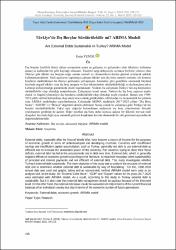| dc.contributor.author | Yenisu, Ersin | |
| dc.date.accessioned | 2021-09-27T08:35:28Z | |
| dc.date.available | 2021-09-27T08:35:28Z | |
| dc.date.issued | 22.03.2020 | en_US |
| dc.identifier.citation | Yenisu, E. (2020). Türkiye’de Dış Borçlar Sürdürülebilir mi? ARIMA Modeli . Afyon Kocatepe Üniversitesi Sosyal Bilimler Dergisi , 22 (1) , 195-213 . DOI: 10.32709/akusosbil.508777 | en_US |
| dc.identifier.uri | https://dergipark.org.tr/tr/pub/akusosbil/issue/52955/508777 | |
| dc.identifier.uri | https://hdl.handle.net/11630/9250 | |
| dc.description.abstract | Dış borçlar özellikle ikinci dünya savaşından sonra az gelişmiş ve gelişmekte olan ülkelerce kalkınma
amacıyla kullanılan bir gelir kaynağı olmuştur. Tasarruf açığı dolayısıyla sermaye birikimi yetersiz olan
Türkiye gibi ülkeler dış borçları çoğu zaman verimli ve ekonomilerin üretim gücünü arttıracak şekilde
kullanamamışlardır. Mali açıklarını kapatmaya çalışan ülkeler için dış borç sarmalı zamanla söz konusu
borçların sürdürülemez bir düzeye gelmesine yol açmıştır. Literatüre göre genellikle ekonomik büyüme
üzerinde negatif etkileri olan dış borç anapara ve faiz ödemelerinin sürdürülebilirliği ve dış borçların etkin
kullanıp kullanılmadığı günümüzde önem taşımaktadır. Nitekim bu çalışmada Türkiye’nin dış borçlarının
sürdürülebilir olup olmadığı araştırılmıştır. Çalışmanın temel amacı Türkiye’de dış borç yapısını analiz
etmek ve öngörü yöntemiyle dış borçların sürdürülebilir olup olmadığı tespit etmektir. Bunun için 1990-
2016 yıllık verileri kullanılmış olup analiz aracı olarak grafiklerden, tablolardan ve ekonometrik bir yöntem
olan ARIMA modelinden yararlanılmıştır. Çalışmada ARIMA modeliyle 2017-2025 yılları “Dış Borç
Stoku”, “GSYİH” ve “İhracat” değerleri tahmin edilmiştir. Sonuç olarak bu çalışmaya göre Türkiye’de dış
borçlar sürdürülebilirdir. Fakat eşik değerde bulunulması nedeniyle dış borç yönetiminde ihtiyatlı
olunmasının gerektiği de açıktır. Diğer taraftan dış borç stoku konusu sadece bir ülkenin mevcut mali
dengeleri üzerinde değil aynı zamanda gelecek kuşakların üzerine ekonomik bir yük getirmesi açısından da
değerlendirilmelidir. | en_US |
| dc.description.abstract | External debts, especially after the Second World War, have become a source of income for the purposes
of economic growth in terms of underdeveloped and developing countries. Countries with insufficient
savings and insufficient capital accumulation, such as Turkey, generally not able to use external debt as
efficient and to increase the production power of the economy. For countries trying to close their fiscal
deficits, external debt has led to the unsustainable rise in debt over time. External debt, which is generally
negative effects on economic growth according to the literature, is important nowadays when sustainability
of principal and interest payments and not efficient of external debt. This study investigates whether
Turkey's external debt sustainable. The main objective of the study was to analyze the structure of external
debt and to determine whether external debt is sustainable by way of forecasting. For this, 1990-2016
annual data was used and graphs, tables and an econometric method ARIMA model were used as an
analysis tool. In the study, the "External Debt Stock", "GDP" and "Export" values for the years 2017-2025
were estimated with ARIMA model. As a result, according to this study in Turkey external debt is
sustainable. But it is also clear that external debt management should be cautious because of the threshold
level. On the other hand, the external debt issue should be evaluated not only in terms of the current financial
balances of an individual country but also in terms of the economic burden of future generations. | en_US |
| dc.language.iso | tr | |
| dc.publisher | Afyon Kocatepe Üniversitesi | en_US |
| dc.relation.ispartof | Afyon Kocatepe Üniversitesi Sosyal Bilimler Dergisi | |
| dc.identifier.doi | 10.32709/akusosbil.508777 | |
| dc.rights | info:eu-repo/semantics/openAccess | en_US |
| dc.subject | Dış Borçlar | en_US |
| dc.subject | Ekonomik Büyüme | en_US |
| dc.subject | ARIMA Modeli | en_US |
| dc.title | Türkiye’de dış borçlar sürdürülebilir mi? ARIMA modeli | en_US |
| dc.title.alternative | Are external debts sustainable in Turkey? ARIMA model | en_US |
| dc.type | Article | |
| dc.department | Seçiniz | en_US |
| dc.identifier.orcid | 0000-0002-0235-4270 | en_US |
| dc.identifier.volume | 22 | en_US |
| dc.identifier.startpage | 195 | en_US |
| dc.identifier.endpage | 213 | en_US |
| dc.identifier.issue | 1 | en_US |
| dc.relation.publicationcategory | Makale - Ulusal Hakemli Dergi - Başka Kurum Yazarı | en_US |



















